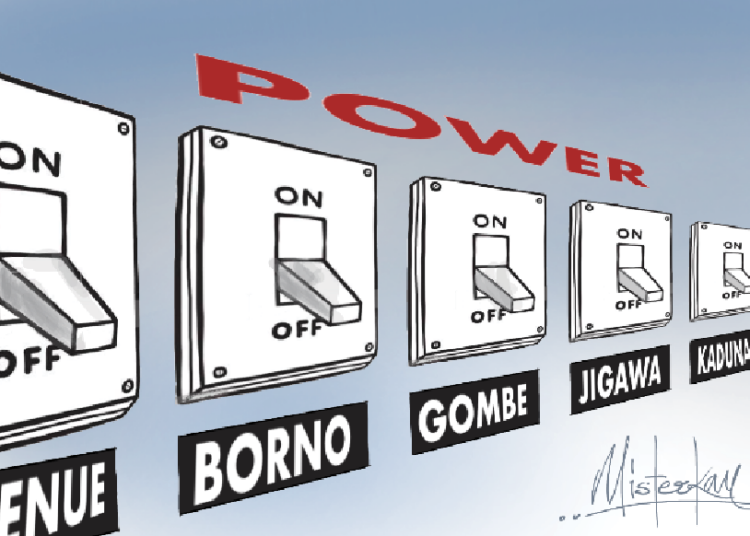Before power was restored yesterday evening, the last ten days were appallingly traumatic for residents in Adamawa, Bauchi, Benue, Borno, Gombe, Jigawa, Kaduna, Kano, Katsina, Kogi, Nasarawa, Niger, Plateau, Sokoto, Taraba, Yobe, and Zamfara states. Nigerians living in these northern states had to endure the harrowing impact of a prolonged power outage after they were plunged into darkness following the disruption of two 330kV Ugwaji-Apir double-circuit transmission lines. Economic activities were paralysed, severely impacting social lives and businesses.
Compounded woes
Apart from throwing millions of households into darkness, crippling businesses, and further compounding the already dire economic situation in the region, some reports even suggest that a lot of lives, including those of babies, were lost in hospitals due to the blackout, with small and medium enterprises—particularly those relying heavily on electricity—completely shut down.
The damaging impact of the power outage is still being felt in various aspects of residents’ lives. The outage occurred at a time when the high price of petrol makes generator use prohibitive. It caused widespread water scarcity for many, especially as most households depend on electrically powered boreholes for water. This has increased the fears of a possible outbreak of diseases. Currently, the region is passing through one of its worst phases, where residents are battling insecurity and the rising cost of food prices in the midst of a power outage, which has engendered water scarcity. What a time to live in the north. Expectedly, the public outcry over the power crisis has been intense.
The outage stemmed from vandalism. Transmission Company of Nigeria (TCN) officials said that repairs had been challenging due to security issues in the areas around the affected power infrastructure. Good enough, power has been restored to most of the affected states.
As a region, the north is trapped in an unfortunate mess, trailing other regions from behind in virtually all development indices. Aside from being the region with the worst incidence of insecurity-Boko Haram and banditry, the north is marked by the highest number of out-of-school children, low literacy rates, a significant population of beggars and destitute, and low enrollment and completion rates for girls in primary and secondary education. Insecurity, worsened by years of neglect, inadequate education, and poverty, continues to stifle growth and development. The power outage- a function of poor investment in the sector- exacerbated these woes, raising questions about how a region blessed with enormous human and material resources faces such severe challenges.
A Bigger Crisis
The power outage and the governors’ passive approach to energy investment reflect a broader historical neglect of key critical infrastructure development by successive northern leadership, including investment in transportation that will facilitate easy movement of farm produce since agriculture is the mainstay of the region’s economy. Neglect by successive leadership is undoubtedly the bigger crisis the North must confront.
Recently, the House of Representatives urged the Ministry of Budget and Economic Planning to allocate funds for the rehabilitation of the Kaura Namoda-Gusau-Funtua-Zaria rail line in the 2025 budget estimates.
Additionally, the House directed its Land Transport Committee to coordinate with the Nigerian Railway Corporation to address the deteriorating state of railway infrastructure, specifically focusing on the Kaura Namoda-Zaria rail line. This resolution followed a motion by Dalhatu Shehu Tafoki, representing the Faskari/Kankara/Sabuwa federal constituency of Katsina state, and seven other members: Abdullahi Balarabe, Aminu Sani, Abdullahi Sadiq Ango, Zubairu Bashiru Usman, Ahmadu Kabiru, Abubakar Mohammed Ahmed, and Abdulmalik Zubairu.
The Kaura Namoda-Zaria rail line, established in 1926, is one of Nigeria’s oldest, linking Kaduna, Katsina, and Zamfara States. Unfortunately, like many other rail lines, it has fallen into disrepair. This particular rail line is crucial for the North-West Zone, an agrarian region with the potential to supply food for the entire country, given its fertile land for crops like rice, maize, guinea corn, millet, beans, soybeans, and groundnuts. A functional railway would significantly aid the swift transportation of goods and people, especially when high petrol costs make road travel unaffordable for many.
However, the Kaura Namoda-Zaria line is not the sole railway in disrepair. Aside from the Kaduna-Abuja line, functional railways are scarce in the North. It’s hard to understand how the nation has neglected rail transport despite its safety and reliability in moving goods and people. Unfortunately, Nigeria’s systemic issues have hindered railway development as in other cases. Efficient rail transport connects rural areas with urban centres, stimulates trade, generates economic growth, and creates jobs, remains invaluable. Consequently, the House of Representatives’ push for the Kaura Namoda-Zaria rail line’s repair is timely and commendable.
Above all, a functional Kaura Namoda-Zaria rail line would provide a viable transport alternative, especially for citizens in these states grappling with excruciating poverty caused by banditry and inequitable economic policies. Revamping the rail line is one of the numerous infrastructure facelifts the north is desirous of. But what can the North do to overcome these challenges?
Needed: An Alternative Source
More than ever, the recent blackout underscored the urgent need for northern states to pursue alternative power sources. Why, for example, haven’t the governors pushed for investment in renewable energy? Why can’t the states build their own respective power plants? It remains perplexing that the entire region is solely dependent on the national grid. Now is the time for each northern state to consider generating its electricity. The Electricity (Amendment) Act 2024 empowers states to regulate electricity markets and license private investors for mini-grids and power plants. President Bola Ahmed Tinubu, early this year, signed this Act. It allows states to oversee their electricity markets, giving them the authority to grant licenses to private investors for setting up mini-grids and power plants within the state. So, what are the governors waiting for?
As for the North’s unending misery, the 19 northern governors must commit to collectively combating insecurity by genuinely investing in economic empowerment, education, and agriculture. Although insecurity is a national malaise, its impact is felt most in the North. The reasons are simple. Only the North can address this. Resolving this requires a general improvement in the quality of governance in the region. At the moment, it is utterly low.
We’ve got the edge. Get real-time reports, breaking scoops, and exclusive angles delivered straight to your phone. Don’t settle for stale news. Join LEADERSHIP NEWS on WhatsApp for 24/7 updates →
Join Our WhatsApp Channel











